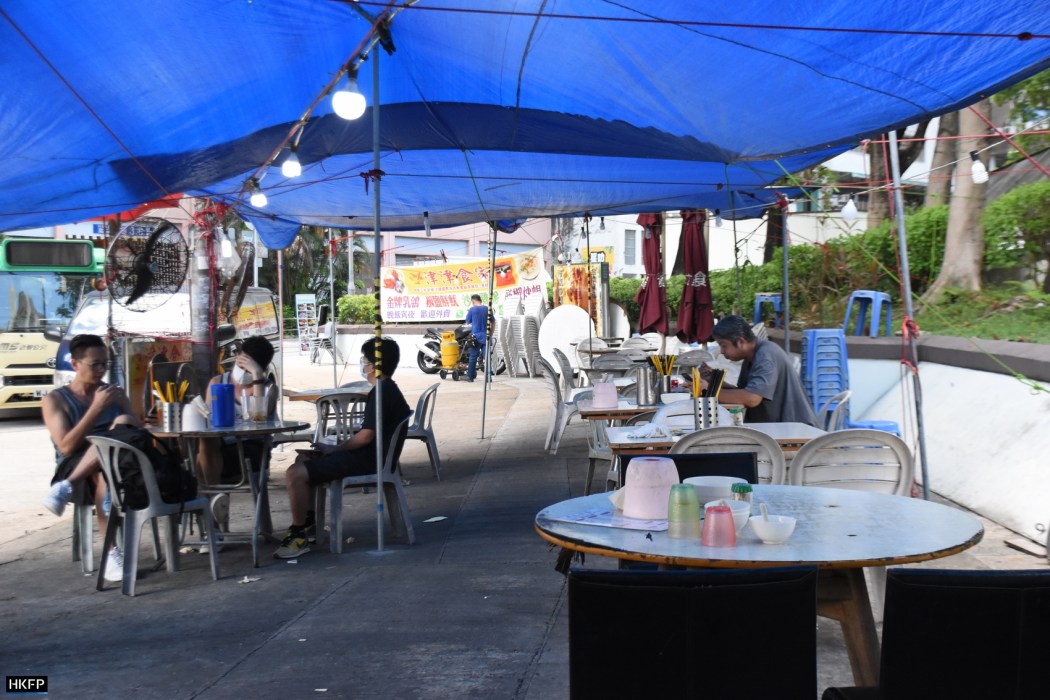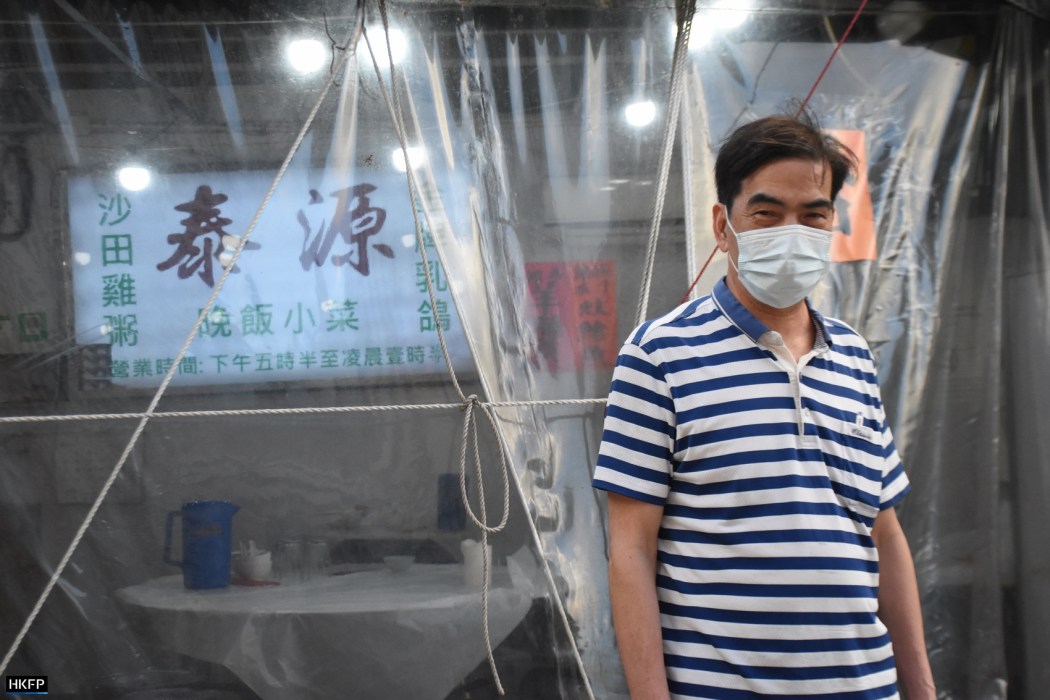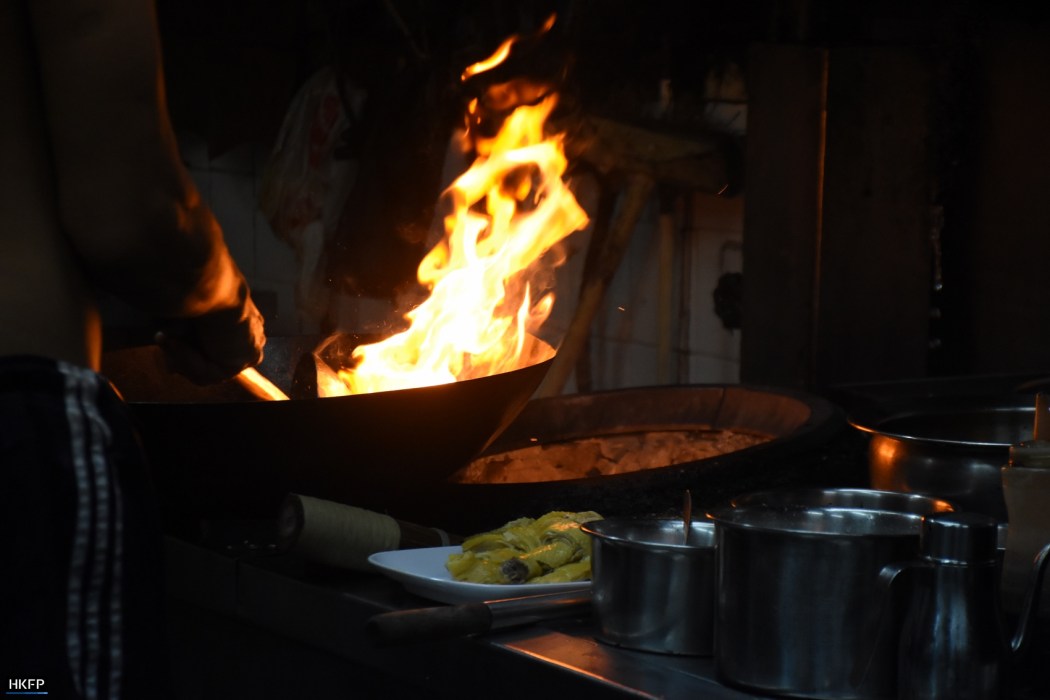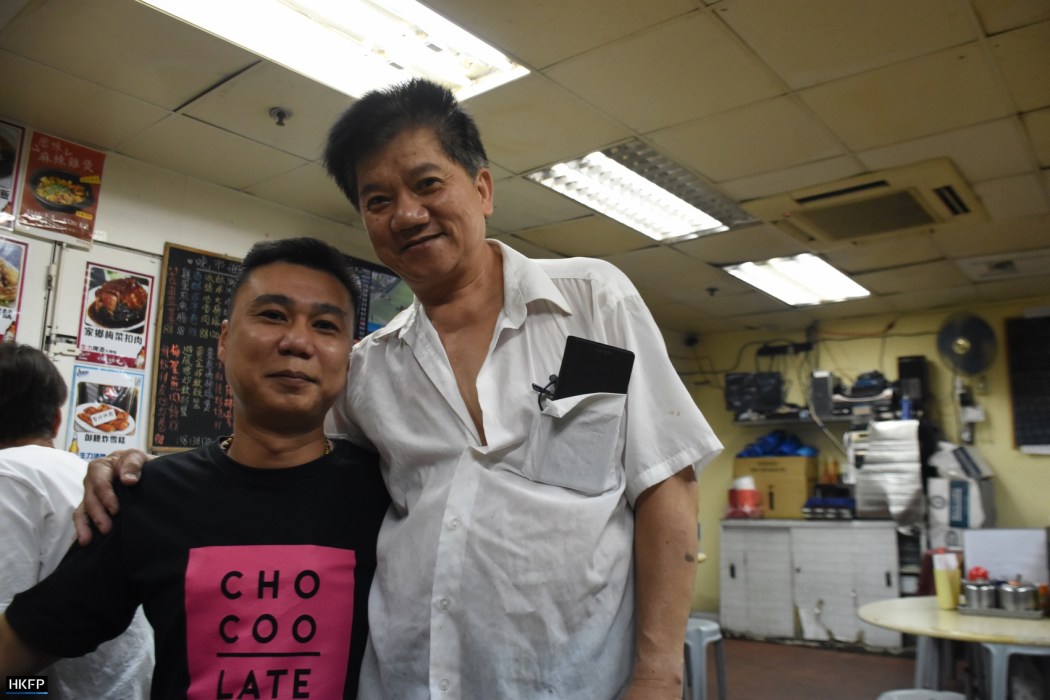“When we first came here, it was just a piece of wasteland but we worked hard. Finally, when the area has become a community, not just an industrial area, we are told to leave. Don’t you think it’s outrageous?” said Mr. Chan, owner of the Kam Kee dai pai dong in Fo Tan.
Now he and the other dai pai dong owners face eviction under government plans to redevelop the site, and many are unhappy at the prospect of losing customers who have become friends over the years.

Chan’s parents started a dai pai dong in Sha Tin and later moved to a temporary market in Fo Tan. He took over Kam Kee from his parents in the 1980s when the restaurant moved to its current location at the Fo Tan East Cooked Food Market.
Dai pai dongs, a staple of Hong Kong food culture, literally mean “stalls with big licence.” During the colonial era, the government issued “big licences” for hawkers in fixed locations and “small licences” for itinerant vendors. With seats in the open air, dai pai dongs are known for their more casual surroundings, relatively cheap prices and large variety of food.
“You can’t be as unconstrained elsewhere,” said Chan, 58. “At dai pai dongs, you can talk loudly, drink beer, and even chitchat with the table next to you – that’s the atmosphere.”
“Some students who used to eat here came specifically after they graduated; my customers were just like friends over the years,” said Chan as a customer walked to the counter to write down and hand in his order for hot milk tea, dropping some cash at the till in the same time.
New town development
Established in 1982, Fo Tan’s East and West Cooked Food Markets currently host nine dai pai dongs which occupy space for 39 stalls. Many owners moved from nearby Sha Tin when the colonial government began developing Fo Tan as one of Hong Kong’s new towns.

Originally an industrial area with factory estates and warehouses, Fo Tan attracted more residents in recent years following the completion of several housing estates, including Chun Yeung Estate and Yuk Wo Court.
Now the markets will soon face demolition following the government’s plan to use the land for community facilities to meet the needs of Fo Tan’s increasing population.
Stall owners were notified at a meeting with the Food and Environmental Hygiene Department on May 10. Under the proposed plans, Fo Tan’s East and West Cooked Food Markets will be demolished by 2024.
While the land on the west side of the market has been reserved for a Joint User Complex, a project dating back to the Regional Council era, the government has yet to announce any plans for the Fo Tan East Cooked Food Market.
Sha Tin District Councillor Felix Chow believes the east side will be developed along with Sui Fai Factory Estate, an industrial building near the market which will be demolished to make way for public housing.

“However, the government had never announced anything,” said Chow. According to documents from a District Council meeting in June, officials said that “the government will make a plan to use the relevant land appropriately in accordance with established procedures.”
“The atmosphere of the meeting was acceptable, but a lot of the older owners had a stronger reaction,” said Chow, referring to the meeting in May which he attended. “Many of them could not accept that quickly their fate, that the dai pai dongs have to be closed in 2024. They also had many questions about the government’s plan.”
“Many also asked whether the meeting was a notification or a consultation.”
‘Outdated compensation’
Stall owners told HKFP that the government has made two compensation proposals. Owners can choose to receive HK$203,000 for each of the stalls they rented, capped at HK$800,000. Alternatively, they can move to other vacant market stalls, and receive compensation equal to 24 months of rent, or HK$180,000, whichever is higher.
Owners complain this is far from satisfactory.
Mr. Chong, owner of the Tai Yuen dai pai dong with branches in both markets, said the calculation of compensation was “outdated.”

“We asked the government how they came up with the compensation plans. They told us quite frankly that it has been used for many years,” said Chong.
“That’s the problem. Maybe 20 or 30 years ago they gave this amount, 10 years ago maybe it was still the same amount, and even for now. Maybe 50 years later it’s still the same, but inflation has been serious [over the years].”
Chong said it would take at least HK$1 million to open a relatively small Hong Kong style tea-house. If they were to reopen a restaurant the size of their current dai Pai dong elsewhere, it would cost at least HK$5 million.
In a response to HKFP enquiries, the Food and Environmental Hygiene Department (FEHD) said that as the landlord, they are only obliged to give at least a month’s notice to tenants, without providing any compensation. The current offers were part of a compassionate arrangement “considering that the tenants’ cooperation can help the government with the smooth closure of the market.”
“Even as landlords, I think the government is different from a private corporation,” said Chong. “I think they [the government] have a social responsibility.”

Tai Yuen moved from Sha Tin to Fo Tan after the colonial government set out a plan to develop Sha Tin around the 1980s.
“Back in the days when they needed us [in Fo Tan], they asked and coaxed us to go there, and we listened and did not develop elsewhere,” said Chong. “Now that they say that the times have changed, shouldn’t they look after us? Don’t treat us as if we’re disposable.”
“Back then the government was not this group of top officials: the people have changed, the promise is gone. Now they talk about the spirit of contract with us, but I think it’s wrong for them to say that, they’re treating themselves as a commercial organisation.”
Chong also lamented the “very bad timing” of the eviction order. He said the protests of 2019 and the coronavirus pandemic had almost brought the restaurant to its knees.
“It’s as if they’re killing us while we’re at our last gasp,” said Chong.
Following the meeting with the FEHD, the stall owners told officials they hope to be relocated in the Joint User Complex. According to Chow, the councillor, the government has yet to announce the list of facilities in the complex.

Chong said they also hope the government can delay demolition of the east side of the market, as no plans have yet been announced for the area. “We want to be able to continue our operations on the east side, and move to a cooked food market in the complex,” he said.
‘Wok hay’ and human touch
Mr. Chow, owner of the Royal Kitchen in the Fo Tan West Cooked Food Market, said he planned to retire in 2024 after the market closed down but hoped the government would allow the younger generation to continue working in the area.
“Food in dai pai dong has another flavour, it’s famous for its ‘wok hay’,” said the 65-year-old, referring to “the breath of a wok” – a smoky flavour arising from the cooking of the dishes in a cast-iron wok over an intensely hot stove.

Chow’s customer of five years, Mr. Hung, said the closing down of the dai pai dongs would mean one less spot for him to meet his friends, and an indoor cooked food market could not compete in terms of atmosphere or congeniality.
“You eat at dai pai dongs for the human touch,” said Hung. “You recognise everyone when you step into the restaurant, people will say hello to you and tell you to sit down and have a beer with them.”

Chan, who has yet to come up with a plan after the market closes, questioned why the government was seemingly determined to erase all the things that make Hong Kong unique.
“We feel affectionate about the place after working here for decades. Of course we don’t want the place to be demolished, this is a tourist attraction after all,” said Chan. “Once it’s been demolished, we’ll have one less piece of collective memory; why do you have to rid Hong Kong of its characteristics?”
“We have done so much for the community. Even if I haven’t achieved much, I have put so much effort in,” said Chan. “Now that the community is complete, our historical mission was also complete and were told to leave. What kind of government is this?”
Support HKFP | Policies & Ethics | Error/typo? | Contact Us | Newsletter | Transparency & Annual Report | Apps
Help safeguard press freedom & keep HKFP free for all readers by supporting our team

LATEST FROM HKFP
HKFP has an impartial stance, transparent funding, and balanced coverage guided by an Ethics Code and Corrections Policy.
Support press freedom & help us surpass 1,000 monthly Patrons: 100% independent, governed by an ethics code & not-for-profit.










